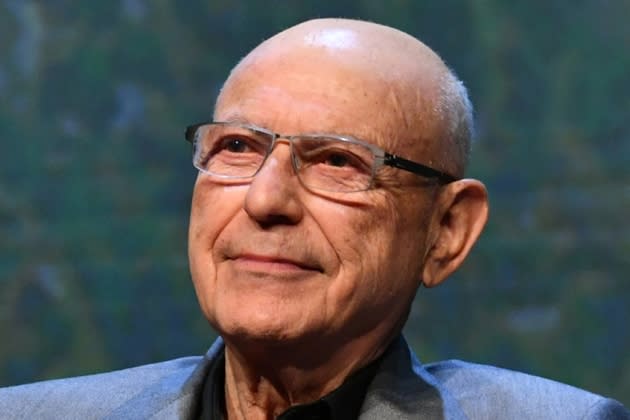Alan Arkin Remembered: ‘The Russians Are Coming, The Russians Are Coming’ Director Norman Jewison on His ‘Brilliantly Funny’ Friend
- Oops!Something went wrong.Please try again later.
- Oops!Something went wrong.Please try again later.
- Oops!Something went wrong.Please try again later.

Alan Arkin etched many indelible performances over his long career in movies. From heroin-snorting grandfathers (“Little Miss Sunshine”) to ornery movie producers (“Argo”) to harried dentists (“The In-Laws”), Arkin, who died on June 29 at the age of 89, played an extraordinary range of roles with great gusto.
But it’s fair to say that none of it would have been possible were it not for 1966’s “The Russians Are Coming, The Russians Are Coming,” a Cold War comedy that marked Arkin’s first major screen role. It’s the film that earned him the first of four Oscar nominations (he’d win for 2006’s “Little Miss Sunshine”) and a part that launched his career as a shape-shifting character actor.
More from Variety
And it was Norman Jewison, riding high on the success of “The Cincinnati Kid,” who took a bet that Arkin, a gifted Broadway actor but movie novice, could make the transition from stage to screen. He plays a Russian “political officer” who takes a small troop of men into a sleepy island community in the United States after their submarine runs aground. Jewison says that Arkin was such a chameleon, many viewers were stunned to find out that the Brooklyn-born actor wasn’t, in fact, Russian. Jewison spoke with Variety about working with Arkin on the comedy masterpiece and his boundless acting abilities.
Alan was a close friend, as well as one of my best performing actors. When I found out that he had died, I started thinking about the first time we met. I was in New York, and he was in a play that Mike Nichols directed called “Luv” with Eli Wallach and Anne Jackson. He had such a gift for accents.
When I was getting ready to make “The Russians Are Coming, The Russians Are Coming,” I remembered that and I called him up and said, “I need someone who can play a Russian and be completely believable.” He came over to the studio — I don’t think he’d ever made a movie before — and we did some improv. I had him play a KGB member who was traveling with the Bolshoi Ballet while they were in America to make sure they didn’t get into any trouble. He was just perfect.
The studio didn’t want him, but it’s never easy to find the right actor for a part, so I just pushed it. I told them that they already had Eva Marie Saint and Carl Reiner and other well-known actors, and so we stayed strong and made it happen.
To prepare for the role, he found this Russian, a diplomat or something, from the south of Russia. I think he was from Tbilisi in Georgia, so he had sort of the Russian version of a Southern accent. And they worked on the lines, particularly the Russian translations. It was exciting to see how immersed he got in the part.
Because he had that training from his time at Second City, he was such a gifted improviser. He and Carl would basically throw the script away. They were just brilliantly funny. Alan was new to film, but it didn’t show. He was relaxed on set. He didn’t seem to be tense at all. I always see that confidence in really great improvisational actors.
There’s a scene towards the end of the film where he’s getting in the submarine and saying goodbye to the Americans he’s gotten so close to, and he just breaks your heart. When we shot it, Alan was on this styrofoam submarine that my production designer had created. It looked real most of the time, but if there were a lot of waves the whole thing would bend and start to fall apart.
Maybe it’s good that he wasn’t a well-known actor at the time, because people accepted his brilliant performance to the point where they believed he was Russian. That’s not easy for an American actor to pull off. But the most important thing for an actor is believability, and you always believed Alan when he was on screen. I ended up showing the film in Moscow to the Russian Film Workers Union and they said, “Oh, he’s really from Georgia. He sounds like he’s from Tbilisi.” So they also believed totally in his performance. And that was always true of Alan, from “Little Miss Sunshine” to “Popi,” where he plays a Puerto Rican man, you just accepted him as genuine when he was on screen.
When the film came out, it was the height of the Cold War, so it was controversial to be making fun of all that. But it just took off. And Alan, who was the centerpiece of the film, got an Academy Award nomination for the performance. It kind of clicked off his career.
We stayed close, but I never had the opportunity to work with him again. I just never had a part that I thought was right for him. When I direct a film, I’m always strongly supportive of my actors. Alan appreciated that. Years later, he told me, “I think I enjoyed making ‘Russians Are Coming’ more than anything I’ve ever done.” And he looked at me and said, “That movie worked because of you.” And I said, “No Alan, it was because of your talent. You are a gifted, gifted man.”
Best of Variety
Sign up for Variety’s Newsletter. For the latest news, follow us on Facebook, Twitter, and Instagram.
